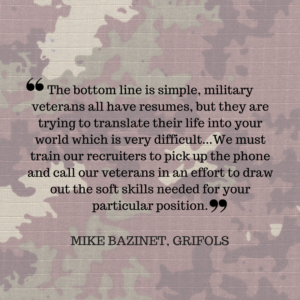Member Mike Bazinet, Associate Director of Plasma Recruitment at Grifols Inc. is authoring a series of guest posts on how employers can be more effective with their veteran recruitment, outreach and retention efforts. Be sure to read Mike’s previous post, “The Interview from a Veteran’s Point of View.”
Resumes, we all have one, reviewed thousands and more than likely may have chuckled at a few but we all know the importance of a good resume. They can make or break an interview; a good resume in today’s society is paramount to finding employment. Recruiters and hiring managers have reviewed resumes throughout their entire professional career. There are thousands of resumes, varying in size, format, type, font and a litany of other differences. It is our responsibility to review them and find the actual content. Easier said than done in some cases, especially in a veterans resume.

Recently, I was at a conference and I was listening to an ex-army infantryman speaking and listened to how he got to his current position in Corporate America. The direct skills of an infantryman were not what got him to his position; it was the soft skills that were not written in the resume that put him in his current position. My story is the same, how does an Air Force Master Sergeant go from dropping bombs on bad people to an Associate Director of Human Resources. I can assure you, it was not because of my direct skill sets of being an Air Force TACP. It was the soft skills that I acquired along the way in my career, the leadership and management styles, the empowerment and teamwork that helped me throughout my career. Those traits and characteristics are what put me on my path in Corporate America; I was lucky enough to interview with a Vice President who viewed my resume with the thought process that she would need to ask more questions that normal to truly understand the veteran sitting in front of her.
Through what eyes do we need to view the veteran resume? It is so easy for us to resume screen and pass on it, if we do not see what we need in the first quarter of the resume we tend to move to the next candidate. I train my recruiters to NOT resume screen, we miss so many good candidates when this practice creeps into our workload. If a veteran’s resume crosses your desk, you simply cannot resume screen it, you must call the veteran and conduct a phone screen. In my previous blogs, I stated, “the veteran does not know anything about your world, therefore how do you expect them to translate their world to you in a written document?” We must give the veteran a chance to conduct a phone screen. Below is a list of items you may see on a veteran’s resume, if you see these, it is time to pick up the phone and make sure you do not whittle out a solid contributor.
See the list below:
- Acronyms – We have hundreds in Corporate America – they have thousands!
- Summary focuses on military operations – this is usually about warfighting and hard to relate to what we need them to do in our specific job. Trust me, the soft skills are here but we need to ask them to explain them.
- Job duties focus all on military duties only, with no mention of soft skills – a skilled recruiter can draw those soft skills out during a phone screen.
- Military rank is used as the job title – veterans go by their rank, which is what they are called all day, there are job descriptions but our name is essentially our rank/job. Your recruiters must be able to translate that rank into the corporate hierarchy of the particular company.
The bottom line is simple, military veterans all have resumes, but they are trying to translate their life into your world which is very difficult for the reason stated above. We must train our recruiters to pick up the phone and call our veterans in an effort to draw out the soft skills needed for your particular position. There are many jobs in the military that translate well into Corporate America but there are others that have no direct correlation based on job duties. With that said, the soft skills learned and used in the military are far superior than what I have witnessed in Corporate America, those are the skill sets we must look for in our veterans. Given a chance, they can change your company. I was given that chance and I have grown to the level I am at simply because of the soft skills I learned in the service. One Vice President saw past the written words, in her mind words on paper were simply words on paper, she wanted more. She wanted to hear about the substance of the veteran sitting in front of her nine years ago, she gave me a chance to explain my resume and for that, I am eternally grateful to her. MAKE IT A GOOD DAY AND HIRE A VETERAN!
Mike Bazinet is the Associate Director of Plasma Recruitment with Grifols Inc., a global healthcare company that creates 53 annual affirmative action plans. During a 20-year career in the United States Air Force, he recruited pilots, navigators, engineers, medical doctors, nurses and pharmacists. As a civilian, he worked for Orion International, a recruitment organization specializing in assisting retiring and separating veterans to gain access to positions within Corporate America. He was also instrumental in creating and launching the Orion International Health Professions division. In 2008, Mike took a recruiting position at Grifols and was quickly promoted to Supervisor of Recruitment in 2009, then Manager of Recruitment in 2011. In 2014, his team achieved a milestone year, hiring over 3,400 new employees. His team surpassed that milestone in 2015 and hired a total of 3,700 employees into the Grifols family. In his current role as Associate Director of Staffing, Mike has control of the strategic development and process of the recruitment efforts within Grifols Plasma Organization. Since being at Grifols Mike has been directly involved with the affirmative action program at Grifols and has played an integral part in the training and execution of the overall program at Grifols.


